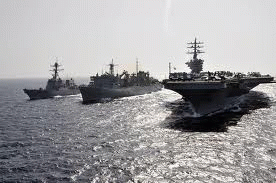The United States will deploy the majority of its naval forces to the Asia-Pacific region over the next decade, Secretary of Defense Leon Panetta announced Saturday in a speech to a security conference in Singapore. The move is part of a major shift in the global strategy of American imperialism that puts China at the top of the US target list.
The mobilization of warships will be accompanied by an increase in the number of military exercises conducted by the Pentagon in the region, involving air, sea and land forces. Most will be carried out in conjunctions with countries that are openly or tacitly allied with the US against China, including Japan, South Korea, Australia and the Philippines.
In his speech to the conference, Panetta elaborated on the "pivot to Asia" announced by Obama last year, in which he indicated that the withdrawal of US forces from Iraq and the beginning of a drawdown from Afghanistan would allow the US military to deploy far greater resources to the Far East.
"All of the U.S. military services are focused on implementing the president's guidance to make the Asia-Pacific a top priority," Panetta said, adding: "While the U.S. military will remain a global force for security and stability, we will of necessity rebalance towards the Asia-Pacific region."
The current deployment of the US Navy is approximately a 50-50 split between the Atlantic and Pacific. This will change by 2020 to a 60-40 split in favor of the Pacific, Panetta said: "That will include six aircraft carriers in this region, a majority of our cruisers, destroyers, Littoral Combat Ships, and submarines." He called these forces "the core of our commitment to this region."
Panetta singled out for praise the agreement last fall with the Australian government for the deployment of US Marines in northern Australia, calling it "a critical component" of the US military buildup.
"This Marine Air-Ground Task Force will be capable of rapidly deploying across the Asia-Pacific region," he said, thus confirming that it will be able to intervene at key choke points like the Strait of Malacca, vital to China's export and import trade, particularly oil supplies from the Middle East and Africa.
The US is negotiating a similar agreement for stationing ground forces on a rotating basis in the Philippines, he said, and is pursuing such arrangements with other countries in the region, although he did not name them. In 2011 the US military conducted 172 military exercises in the Asia-Pacific region, and that number will increase considerably this year.
Panetta claimed that the US buildup was not directed against China, and even made the Orwellian claim that "increased US involvement in this region will benefit China as it advances our shared security and prosperity for the future."
There is no mistaking the meaning of the measures he announced, however. More than half the US Navy is to be deployed to the Asia-Pacific. What other country could be the target?
North Korea has a handful of coastal vessels that are no threat to South Korea, let alone the United States. Nearly every other country in the region is either a formal US ally, like Japan, South Korea, the Philippines and Australia, a client state like Taiwan and Singapore, or a prospective partner in military action against China, like India.
When Panetta declared, referring to US relations with China, "We in the United States are clear-eyed about the challenges," all the conference participants, as well as Beijing, undoubtedly got the message.
If there were any doubts, Panetta closed his address with an invocation of the history of US wars in the region. "Over the course of history, the United States has fought wars, we have spilled blood, we have deployed our forces time and time again to defend our vital interests in the Asia-Pacific region," he declared.
Panetta followed up his appearance in Singapore with a visit to two countries that have fought wars with China in the past 50 years--Vietnam (which fought a war with China in 1979) and India (in 1962). In Vietnam Sunday he spoke to US sailors on board a naval supply ship anchored at Cam Ranh Bay, which was the biggest US Navy base in Asia during the US war in Vietnam.
Besides the public posturing, Panetta had closed-door meetings on the sidelines of the Singapore conference with a series of defense ministers and other top officials from Japan, South Korea, the Philippines, Australia, Malaysia and Singapore. The defense ministers of Thailand and Cambodia invited Panetta to visit their countries.
(Note: You can view every article as one long page if you sign up as an Advocate Member, or higher).





